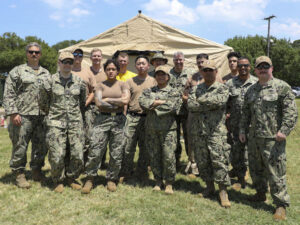
Story by Desmond Martin
Navy and Marine Corps Force Health Protection Command
Virginia Beach, VA – Forward Deployable Preventive Medicine Unit Two (FDPMU 2) demonstrated Navy Medicines commitment to readiness by participating in the annual Trident exercise from June 3-7, 2024, at Joint Expeditionary Base – Little Creek.
Trident is a joint-maritime exercise designed to certify and validate training that is focused on key areas for special operations and conventional forces to work together effectively.
During the event, FDPMU 2 played a crucial role. Their mission was to develop and simulate the delivery of agile, scalable, trained, and certified medical units, providing enduring support for joint forces in crisis and combat scenarios.
During Trident 2024, FDPMU-2 conducted realistic training, showcasing their ability to provide critical support in high-stakes environments. “It’s important for the FDPMU to be integrated into this exercise,” said Chief Hospital Corpsman Coby Davis, a senior enlisted leader with the Navy Environmental Preventive Medicine Unit Two (NEPMU-2), attached to FDPMU 2.
“We offer theater validation support for chemical biological agents, a unique capability of the Navy FDPMU. Stress testing our logistics and operations in this exercise is essential for identifying gaps and ensuring our deployment readiness.”
By 2027, Navy Medicine aims to deliver agile, scalable, trained, and certified medical units to support the Fleet, Fleet Marine Force, and Joint Forces in high-end competition, crisis, and combat. This exercise is a step toward achieving that vision, ensuring that Navy Medicine is organized to facilitate all phases of Force Development, Force Generation, Force Preservation, and full restoration of the warfighter.
A key line of effort for Navy Medicine is the delivery of Expeditionary Medicine Systems (EXMEDS). FDPMU-2’s participation in Trident 2024 is a testament to this commitment. Their efforts are vital in sustaining the readiness and resilience of U.S. forces by mitigating health risks that could impair combat effectiveness.
During the exercise, FDPMU 2 deployed a field tent equipped with advanced devices and tools used to identify various chemical threats. “The exercise began with logistics coordination, allowing us to tailor our gear for specific missions,” said Lt. Cmdr. Cyrus Haselby, a physician with NEPMU-2 and team lead for FDPMU-2. “We exercised a capability to request specific sub-sets instead of entire gear sets, making us more lightweight and mission tailored.”
Davis agreed and highlighted a significant innovation, “We transformed a small Base-X 103 tent (a small tent) into a mobile laboratory with temperature control, achieving validation in a mobile capacity. This minimized our footprint while maximizing our analytical capability.” In a laboratory environment achieving validation is essential for ensuring accuracy, dependability, and safety.
The exercise emphasized the importance of joint force operations. Training alongside the Air Force Capability: Critical Care Air Transport Team and the Army Decontamination Team fostered collaboration and understanding of each service’s capabilities. “We need to support each other in high-end conflicts or near-peer situations,” said Haselby. “These complementary missions require us to leverage each other’s strengths.”
Davis underscored the shift towards a more integrated military, “Gone are the days of each branch operating in isolation. It’s essential for us to train with our sister services to understand and recognize each other’s capabilities. This familiarity ensures seamless cooperation when we face real-world challenges.”
The participation of FDPMU-2 in Trident 2024 highlights Navy Medicine’s strategic commitment to delivering agile and scalable medical support. Their efforts during the exercise underscore the pivotal role of health preservation within broader military strategy, ensuring the readiness and resilience of U.S. forces.